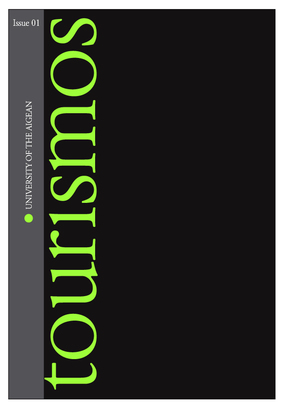Arguments in favor of taxing tourism : the Lanzarote case study
Part of : Tourismos : an international multidiciplinary journal of tourism ; Vol.7, No.2, 2012, pages 401-415
Issue:
Pages:
401-415
Section Title:
Research papers
Author:
Abstract:
This work discuss the theoretical foundation for the introduction of a taxation mechanism capable of collecting the necessary and indispensable financial resources to carry out public policies aimed at planning and managing tourism development. The research focus on some dynamics observable in Lanzarote (Spain), where different aspects and impacts of tourism development are identified and analyzed to demonstrate the existence of external costs. The ascertainment of external costs in Lanzarote leads the research to examine the theory of the “rent capture” as Hartwick proposes to reach some conclusions as the use of tax revenues for the enlargement of the carrying capacity of physical facilities or the funding of research for improving destination management strategies. The originality of this article is to delve into the theoretical justification for the implementation of a taxation mechanism at tourism destinations.
Subject:
Subject (LC):
Keywords:
tourism destination management, external costs, taxation mechanism
Notes:
Περιέχει σχήματα, πίνακες και βιβλιογραφία
References (1):
- Barbier, E.B. & Markandya, A. (1990). The conditions for achieving environmentally sustainable development. European Economic Review, Vol. 34, No.2-3, pp.659-669.Barbier, E.B., Burgess, J.C. & Folke, C. (1994). Paridise Lost? The Ecological Economics of Biodiversity. London, Earthscan.Bird, R.M. (1990). Expenditures, administration and tax reform in developing countries. Bulletin for International Fiscal Documentation, Vol. 44, No.6, pp.263-267.Bird, R.M. (1992). Taxing tourism in developing countries. Journal of World Development, Vol. 20, No.8, pp.1145-1158.Bonham, C. & Byron, C. (1996). Intervention analysis with cointegrated time series: the case of Hawaii hotel room tax. Applied Economics, Vol.28, No.10, pp.1281-1293.Bonham, C., Fujii, E., Im, E. & Mak, J. (1991). The impact of the hotel room tax: an interrupted time series approach. National Tax Journal, Vol.45, No.4, pp.433-441.Boyra, J. (2009). Looking for environmental excellence in tourist destinations. Tourismos: an International Multidisciplinary Journal of Tourism, Vol. 4, No.2, pp.91-106.Brida, J.G. & Pereyra, J.S. (2009). Tourism taxation and environmental quality in a model with vertical differentiation. Tourismos: an International Multidisciplinary Journal of Tourism, Vol. 4, No.1, pp.45-62.Brida, J.G. (2011). Second homes and the need for policy planning. Tourismos: an International Multidisciplinary Journal of Tourism, Vol. 6, No.1, pp.141-163.Butler, R. (1980). The concept of a tourist area cycle of evolution: implications for management of resources. Canadian Geographer, Vol. 24, No.1, pp.5-12.Cabildo de Lanzarote (2009a). Demographic figures 2008, Lanzarote.Cabildo de Lanzarote (2009b). Tourist statistics 2002, 2005, 2007, 2008, Lanzarote.Common, M. & Perrings, C. (1992). Towards an ecological economics of sustainability. Ecological Economics, Vol. 6, No.1, pp.7-34.Dodds, R. & Butler, R. (2010). Barriers to implementing sustainable tourism policy in mass tourism destinations. Tourismos: an International Multidisciplinary Journal of Tourism, Vol. 5, No.1, pp.35-53.Fennell, D.A. & Ebert, K. (2004). Tourism and the precautionary principle. Journal of Sustainable Tourism, Vol. 12, No.6, pp.461-479.Forsyth, P. (1997). Taxing tourism? Paper presented at the Australian Tourism and Hospitality Research Conference. Monash University, Sidney, Australia: 6-9 July 1997.González Morales, A. & Hernández, J.A. (2005). El Desarrollo del Turismo en Lanzarote. Lanzarote, Ediciones Idea.Hall C.M. (1998). Historical antecedents of sustainable development and ecotourism: new labels on old bottles? In C.M. Hall and A.A. Lew (Eds.) Sustainable Tourism: A Geographical Perspective, New York: Longman.Hanley, N., Shogren, J.F. & White, B. (1997). Environmental Economics in Theory and Practice. London, Macmillan.Hartwick, J.M. (1977). Intergenerational equity and the investing of rents from exhaustible resources and intergenerational equity. American Economic Review, Vol. 67, No.5, pp.972-974.Hartwick, J.M. (1978). Substitution among exhaustible resources and intergenerational equity. Review of Economic Studies, Vol. 45, No.2, pp.347-354.Hartwick, J.M. & Olewiler, N.D. (1998). The Economics of Natural Resource Use, 2nd Edition, Addison-Wesley Educational Publishers, New York, pp. 57-59.Spilanis, I.P. & Karayiannis, O.P. (2009). Tourism and the environment: pressures of tourism related construction activity on the natural environment of host areas-attempting a survey in the Cyclades. Tourismos: an International Multidisciplinary Journal of Tourism, Vol. 4, No.4, pp.17-34.Perman, R., Ma, Y. & McGilvray, J. (1996). Natural Resources and Environmental Economics. London, Longman.Prats, F. (2001). Evolution of Insular Indicators (1996-2001). Life Lanzarote in the Biosphere 2 (2001-2004): Exploring New Lines of Action,Financing and Taxation for the Reserve of the Biosphere. European Commission Life Programme.Skanavis, C. & Sakellari, M. (2011). International tourism, domestic tourism and environmental change: environmental education can find the balance. Tourismos: an International Multidisciplinary Journal of Tourism, Vol. 6, No.1, pp.233-249.UNESCO (2002). Lanzarote. [Internet]. Available from: http://www2.unesco.org/mab/. Accessed the 28th of February 2005 at 13:32 and the 7th of May 2009 at 19:27.Vincent, J.R. (1997). Resource depletion and economic sustainability in Malaysia. Journal of Environment and Development Economics, Vol. 2, No.1, pp.19-37.Vincent, J.R. (2000). Green accounting: from theory to practice. Journal of Environment and Development Economics, Vol. 5, No.1, pp.13-24.Wicks, B., Muzzaffer, U. & Sookon, K. (1994). The effect of lodging prices on visitors’ demand: Everglades national park. Hospitality Research Journal, Vol. 17, No. 2, pp.51-62.World Tourism Organisation Business Council (1998). Tourism Taxation: Striking a Fair Deal. Madrid: World Tourism Organization.




